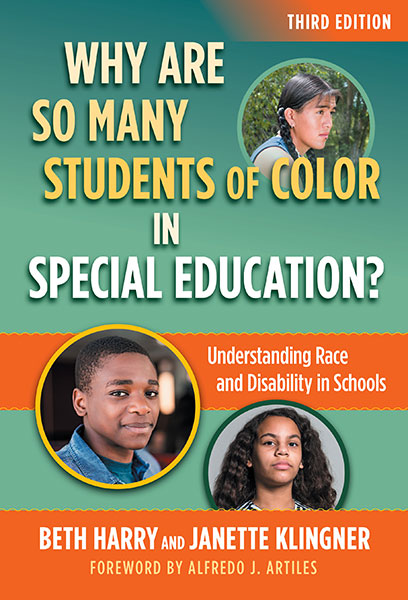Professors: Request an Exam Copy
Print copies available for US orders only. For orders outside the US, see our international distributors.
Third Edition
Foreword by: Alfredo J. Artiles
Publication Date: August 26, 2022
Pages: 272

Bringing to life the voices of children, families, and school personnel, this bestseller describes in detail the school climates and social processes that place many children of color at risk of being assigned inappropriate disability labels. Now in its third edition, this powerful ethnographic study examines the placement of Black and Hispanic students in the subjectively determined, high-incidence disability categories of special education. The authors present compelling narratives representing the range of experiences faced by culturally and linguistically diverse students who fall under the liminal shadow of perceived disability. This edition updates the literature on disproportionality, highlighting the deeply embedded and systemic nature of this decades-old pattern in which reforms represent mere shifts across disability categories, while disproportionality remains. Applying lenses of cultural-historical and critical disability theories, this edition expands on the authors’ previous theoretical insights with updated recommendations for improving educational practice, teacher training, and policy renewal.
Book Features:
Beth Harry is a professor emerita of special education in the Department of Teaching and Learning at the University of Miami. She is also the founder of the Immortelle Centre for Special Education in Port of Spain, Trinidad. Janette Klingner (deceased) was a professor at the University of Colorado, president-elect for the Council for Exceptional Children (CEC), and a vice-president for the International Academy for Research in Learning Disabilities.
"This book provides a thorough and detailed description of the multiple factors that combine to provide inequitable educational opportunities for minority students living in poverty."
—Teachers College Record (review of first edition)
“Harry and Klingner challenge us to rethink our society’s equity commitments and to offer educational opportunities to students with ability and racial differences. Using a perspective informed by interdisciplinary tenets about the anthropological, historical, spatial, and sociological nature of human development, the authors grapple with the transformation of the canonical toolkit used to identify ability differences. Their work makes a substantial contribution to a new generation of equity research concerned with the complexities of 21st-century education in pluricultural societies.”
—From the Foreword by Alfredo J. Artiles, Stanford University
Contents
Foreword to the Third Edition Alfredo J. Artiles ix
Acknowledgments xi
1. Introduction 1
2. Overview: Racial/Ethnic Disproportionality in Special Education 39
3. School Structure: Institutional Bias and Individual Agency 58
4. Cultural Consonance, Dissonance, and the Nuances of Racism 74
5. In the Classroom: Opportunity to Learn 90
6. The Construction of Family Identity: Stereotypes and Cultural Capital 103
7. At the Conference Table: The Discourse of Identity Construction 122
8. Bilingual Issues and the Referral Process 143
9. Constructing Intellectual Disability: Cracks and Redundancies 153
10. Constructing Learning Disabilities: Redundancies and Discrepancies 161
11. Constructing Emotional/Behavior Disorders: From Troubling to Troubled Behavior 174
12. Into Special Education: Exile or Solution? 186
13. Conclusions and Recommendations 199
Epilogue. Research Methods: Who Are We, and How Did We Do This Research? 213
References 236
Index 252
About the Authors 259
Professors: Request an Exam Copy
Print copies available for US orders only. For orders outside the US, see our international distributors.